The Lawmatics Blog
Insights on legal marketing, automating the law practice, and legal tech in general
Law firm automation is the practice of centralizing and deploying repetitive, everyday administrative tasks at scale. It achieves this by linking every step of the client journey in one system to automate task triggers, emails, population forms, and reminders.
Legal workflow automation software like Lawmatics doesn’t replace attorneys but enhances them. It integrates with tools like Clio, MyCase, and PracticePanther for full workflow visibility.
Benefits of Legal Workflow Automation for Attorneys
Improved client intake speed and accuracy
Lawyer automation (or attorney automation) tools eliminate manual data entry and automate repetitive tasks at every step of intake, from confirming form submissions to client relationship management (CRM) data entry.
By automating processes like follow-up messaging and scheduling, teams can ensure faster responses and fewer client drop-offs.
As just one example, Lawmatics’ new QualifyAI tool automatically scores and prioritizes incoming leads based on engagement and case fit. This empowers teams to achieve an instant response time.
QualifyAI (and all other Lawmatics tools) is built on trusted internal workflows that help standardize processes and capture complete client information every time.
Reduced human error
Humans are, of course, essential to the operations of any legal practice, and that’s not changing any time soon. But law firms are busy environments, and in all the hustle and bustle, even the most skilled workers can make mistakes.
Legal workflow management software replaces manual document handling and repetitive data entry with automated templates and workflows. This prevents costly miscommunications and prevents tasks from falling through the cracks.
Automated task assignments and reminders also help prevent missed deadlines. For example, Lawmatics enables data sync across multiple systems, including Clio and MyCase, which further reduces inconsistencies.
Centralized data and transparent reporting
Legal practices should keep client data, communications, and metrics in one dashboard to prevent silos. Such centralization also gives managing partners visibility into firm performance and pipeline health in real time. Team members can make big strategic decisions with clarity.
Lawmatics comes with custom reporting tools that make it easy to tie marketing and intake directly to demo requests and revenue.
Streamlined follow-up and client communication
Strong client communication is at the heart of any successful legal team.
Legal workflow automation software allows teams to maintain consistent client contact through automated follow-up emails, reminders, and nurture sequences. With this set up, prospects remain engaged from first inquiry through signed retainer without laborious manual interview.
Lawmatics’ comes with built-in features, like text messaging for law firms, that allow teams to talk to clients and ensure no lead goes untouched.
Increased capacity without adding headcount
Labor costs are among the biggest concerns for a law firm. By automating tasks, law firms can scale their operations efficiently, handling more matters without expanding staff.
QualifyAI from Lawmatics empowers teams to convert more clients with less effort by routing qualified leads directly into workflows.
Lawmatics connects intake, CRM, and drip email marketing software for lawyers. This allows small firms to operate like large ones, using predictive insights that drive faster growth.
Core Legal Workflows Lawyers Can Automate
Legal document automation software has the potential to transform every essential task.
Client intake
Thanks to the large amounts of paperwork that it demands, the client intake process is the most lengthy part of any client lifecycle. Teams who use software can save time with automated intake forms, e-signatures, and data that syncs directly within the CRM.
Lawmatics’ built-in intake automation capabilities connect to follow-up workflows. Teams can save the effort involved in tracking down every client, sending reminders about pending documents like retainer agreements, and manually scheduling next steps.
Through QualifyAI, Lawmatics uses AI-powered lead scoring for law firms to accelerate intake by prioritizing the highest-value prospects first.
Marketing & follow-up
Firms that want to move beyond word-of-mouth client acquisition often spend a significant budget on marketing. Automation software can help reduce these costs by increasing conversation rates and decreasing acquisition costs through triggered drip campaigns, SMS updates, and personalized nurture sequences.
Lawmatics automates all of these processes within one unified dashboard. It makes it easy for teams to assess their marketing return on investment (ROI) at a glance. In turn, they save time and effort on reporting as well as on managing campaigns.
Case Management & communication
Clients who receive an exceptional experience are more likely to turn into promoters. However, firms chasing this exceptional experience can’t afford to miss deadlines or go radio silent during a retainer.
Lawmatics offers task reminders, automated deadlines, and document workflows to make sure every client feels cared for and prioritized. It can even sync with Clio and MyCase to ensure firm-wide synchronization.
Time tracking & billing
Billing and time tracking is an essential part of any law firm’s practice. If invoices are inaccurate, it can have implications on overall company margins,revenue, and reputation.
Lawmatics’ time-tracking tools link directly to invoicing systems, giving firms visibility into productivity and client value per matter. It empowers teams to make strategic, data-driven decisions about internal staffing needs and how to allocate capacity across clients.
5 Steps to Legal Workflow Automation
Law firm automation doesn’t happen overnight, but the process itself is generally straightforward and easy. Here’s how to make it happen.
Step One: Map your current legal workflows
To identify whether your team is a good fit for attorney automation, begin by mapping your legal workflows as they currently exist.
Then, either individually or together as a team, try to identify bottlenecks in intake, communication or billing. Based on the gaps you’ve identified, start writing possible solutions to those gaps. This will give you a list of which features to look for in a tool.
Step Two: Select the right legal workflow automation software
There are many automated legal platforms available on the market. While you’ll want to look for ones that provide the features you’ve indicated in Step One, there is another important factor to consider.
Look for a solution that integrates with your current tech stack. This ensures you can maintain the current operations that are working for you and discard those that aren’t.
Step Three: Start small with high-impact automation
Automation is powerful and, as a result, should be used carefully. It can be tempting to automate everything at once, but this can be quite overwhelming for a team.
Start with one process. Client intake automation is a great place to start. Then, measure results. If you see a positive change, you can move on to the next automation.
Step Four: Train your team for adoption and success
Law firm success depends on the output of the whole team. You need everyone on board in order for your automation efforts to be successful.
The best way to set your team up for success is by providing clarity and templates where possible. Most automation software is easy to learn. But, it can be helpful to go with a system that offers dedicated support in the first few months.
Step Five: Monitor and optimize your automated workflows
There are a few important reasons to monitor and optimize your automated workflows:
- To make sure everything you’ve implemented is serving both the team and the client.
- To make sure you’re receiving a great ROI from your software.
Lawmatics comes with a built-in reporting dashboard that makes it easy to track efficiency gains. Request a demo to see how Lawmatics can help you automate your specific legal workflows.
Common Legal Workflow Automation Challenges and How to Overcome Them
Lawyer automation software is generally simple to implement with amazing returns. However, it’s best to be aware of the possible challenges before you start an engagement. Here are some of the most common issues that law firms run up against:
- Fear of disruption: Fear of change is normal, and if change is associated with disruption and discomfort, the fear can be even worse. It can be hard to sell change-resistant teams on a new tool, especially if they think it’s going to make their job harder.
- Integration fatigue: Most teams have been through countless tools, which means multiple logins and multiple opportunities for headaches. It can be hard to sell a team on a new tool if they don’t truly believe it will make their lives easier.
- Inconsistent workflows: If a team is working on a shaky workflow foundation, it can be hard to know where to begin with automation.
Lawmatics answers all of the above concerns by unifying legal CRM software, automation, intake, and analytics in one easy-to-use platform. Plus, Lawmatics integrations connect with the software your team already uses every day, reducing the time your team spends juggling different systems.
The Future of Legal Workflow Automation: AI-Driven Efficiency
The next wave of legal workflow automation isn’t just about triggering tasks. It’s about software that can anticipate what needs to happen next.
With modern AI workflow automation, your systems can spot patterns in client behavior, score new inquiries, and trigger the proper follow-ups automatically—without adding more work to your team.
That’s where Lawmatics’ QualifyAI comes in. Built directly into Lawmatics' legal CRM, QualifyAI is a sophisticated lead-scoring automation engine designed specifically for law firms. Instead of treating every inquiry the same, it:
- Analyzes client behavior (form submissions, email engagement, response times).
- Reviews communication history and intake answers.
- Interprets engagement signals across your marketing and intake touchpoints.
From there, QualifyAI automatically ranks leads based on fit and intent, so your team knows exactly who to call first.
The benefits are immediate:
- Saves time qualifying leads by replacing manual gut checks with consistent, data-driven scoring.
- Prioritizes high-value clients, ensuring your best opportunities get a faster, more focused response.
- Improves marketing ROI by connecting campaigns and channels to the leads that actually convert.
By pairing AI-driven lead scoring with automation across intake, communication, and reporting, Lawmatics is helping firms move from reactive to truly proactive operations. It’s a clear example of how AI doesn’t replace attorneys—it gives them better information, faster, so they can make stronger decisions.
As AI continues to advance, firms that embrace data-driven workflows will gain a lasting edge: fewer bottlenecks, more predictable growth, and a practice that runs as intelligently behind the scenes as the lawyers who lead it.
Transform Your Firm’s Legal Workflow with Lawmatics
Automation isn’t just about convenience for staff. It’s one of the most reliable ways for law firms to increase profitability and deliver a stronger client experience.
By removing repetitive manual tasks, firms can operate with more consistency, more speed, and far fewer administrative bottlenecks.
Lawmatics makes this possible by streamlining every workflow from initial intake through engaging repeat clients. Its unified system gives firms complete transparency into what’s happening at each stage of the client journey.
Backed by real-time legal analytics and reporting tools, it helps teams make confident, data-driven decisions. QualifyAI pushes these gains even further, giving firms predictive insight into their best opportunities. This way, they can prioritize the right clients at the right moment.
Request a demo to see how Lawmatics transforms legal operations.
Frequently Asked Questions
How can automation help my law firm?
Automation increases efficiency, reduces human error, and helps firms scale without hiring more staff. It frees attorneys from administrative work so they can focus on strategic, billable client work.
What legal tasks can be automated?
Tasks like client intake, document generation, follow-ups, billing, scheduling, and marketing outreach are all strong candidates for automation.
Is legal workflow automation only for large firms?
Not at all. In fact, small and midsize firms often stand to gain the most from automation.
Large firms may use enterprise systems to streamline complex, multi-department workflows. Meanwhile, smaller firms may rely on automation to offset limited staff, improve consistency, and scale client intake without adding headcount.
How does Lawmatics support automation?
Lawmatics combines CRM, client intake, and a legal marketing automation platform into one. The whole platform is supported by QualifyAI, which automatically scores and prioritizes leads for faster response times.
Will automation replace lawyers?
No. Automation handles repetitive tasks so attorneys can focus on legal strategy, client relationships, and work that requires human judgment.
Why automate legal workflow processes?
Automation saves time, reduces errors, and creates consistent, streamlined workflows. It helps firms boost productivity, enhance client satisfaction, and scale without expanding staff.
Running a law firm means juggling a million moving pieces — marketing, client communication, team workflows, and of course, getting paid. Wouldn’t it be nice if more of that just... took care of itself? In our latest Deep Dive webinar, we shared some exciting new features designed to do just that.Your hosts, Lawmatics Product Manager Devon Roth and Sr. Director of Customer Success Johnny Bissell, walked through the newest and upcoming features designed to help law firms work more efficiently and drive growth. From enhanced marketing integrations to improved communication tools and smarter financial workflows, these updates are built to make a real impact on your firm’s success.
Time Stamps of Key Takeaways
9:00 — Google ads integration improvements
Google Ads integration has been enhanced to automatically import UTM values from your ad campaigns. This means that instead of manually tracking and entering UTM data, Lawmatics will now capture it automatically and sync it to your marketing sources. Additionally, Google Click IDs (GCLIDs) are now supported, allowing for more precise conversion tracking.For firms investing in Google Ads, this update eliminates the hassle of manually tracking ad performance. With automatic UTM imports and GCLID tracking, firms can send offline conversion data back to Google via Zapier, providing a clearer ROI picture for paid campaigns.
16:18 — MMS messaging
One of the most highly requested features, MMS messaging, is coming soon to Lawmatics! While firms have long been able to send and receive standard text messages, this new functionality allows clients to send images directly via text. This is particularly valuable for personal injury and family law firms, where clients frequently need to share accident photos, medical documents, or other case-related images.
23:25 — User activity reports
To enhance firm oversight and productivity tracking, Lawmatics is introducing User Activity Reports. These reports will log every action taken by every user, including emails sent, SMS activity, document shares, appointments scheduled, and more. With filtering options by user, action type, and date range, firms can quickly analyze performance, identify trends, and optimize workflows.
33:14 — Surcharging
For firms using LMPay Version 2, a new surcharging option allows firms to automatically add a 3% processing fee to credit card transactions. This helps firms offset processing costs without increasing service fees for all clients.
Webinar slide deck
We know running a law firm means juggling a ton of software. And while each tool is supposed to make things easier, sometimes it feels like they just add more to your plate with duplicate data entry, wasted time, and clients who feel neglected.That’s exactly why we’d like to spotlight our Lawmatics integration with MyCase, one of the leading case management platforms. With this powerful connection, you can manage the entire client lifecycle — from initial inquiry to case resolution and beyond — without the hassle of manual data transfers.
What this integration does for you
Your team shouldn’t have to spend time manually copying client details from one system to another. Technology should lighten the administrative load, not add to it. By linking Lawmatics with MyCase, you get a frictionless transition from client intake to case management, ensuring a more efficient workflow and a better experience for both clients and your team.
A smooth connection from Lawmatics to MyCase
Lawmatics users can automatically or manually sync matters over to MyCase. Any records that have been created in Lawmatics as matters will be pushed into MyCase along with corresponding details like notes and files.
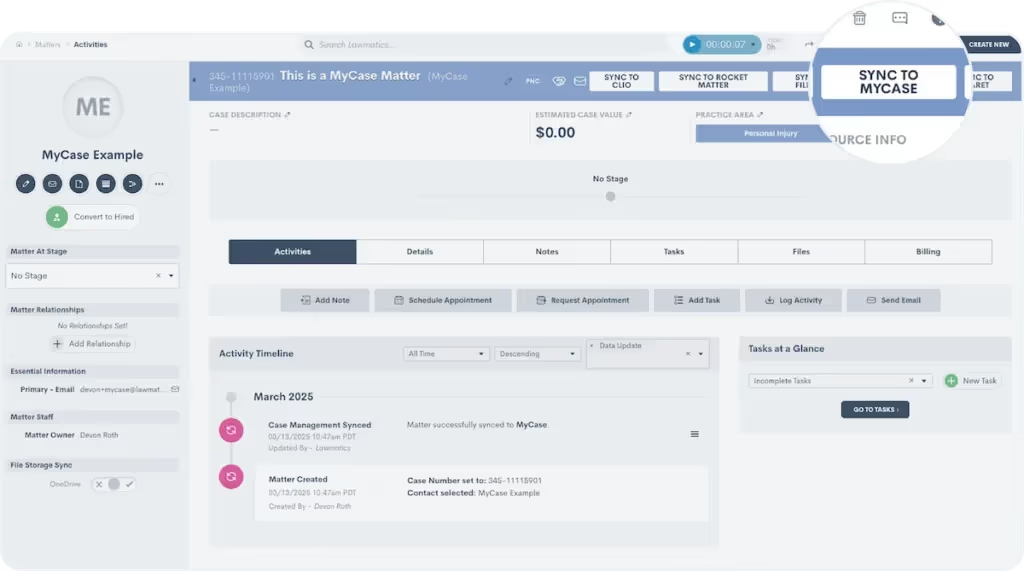
Activating the integration takes just moments. From there, you can define triggers that automatically transfer matter details to MyCase. For example, once a client signs an engagement agreement in Lawmatics, their case file can instantly sync to MyCase, keeping everything up to date without extra effort from your team.
Sync matter details and files automatically
When integrating MyCase with Lawmatics, you can map custom fields from Lawmatics to custom fields in MyCase. Plus, when a matter syncs or converts from Potential New Client to Hired, any files attached to the existing matter in Lawmatics will also move over to MyCase.
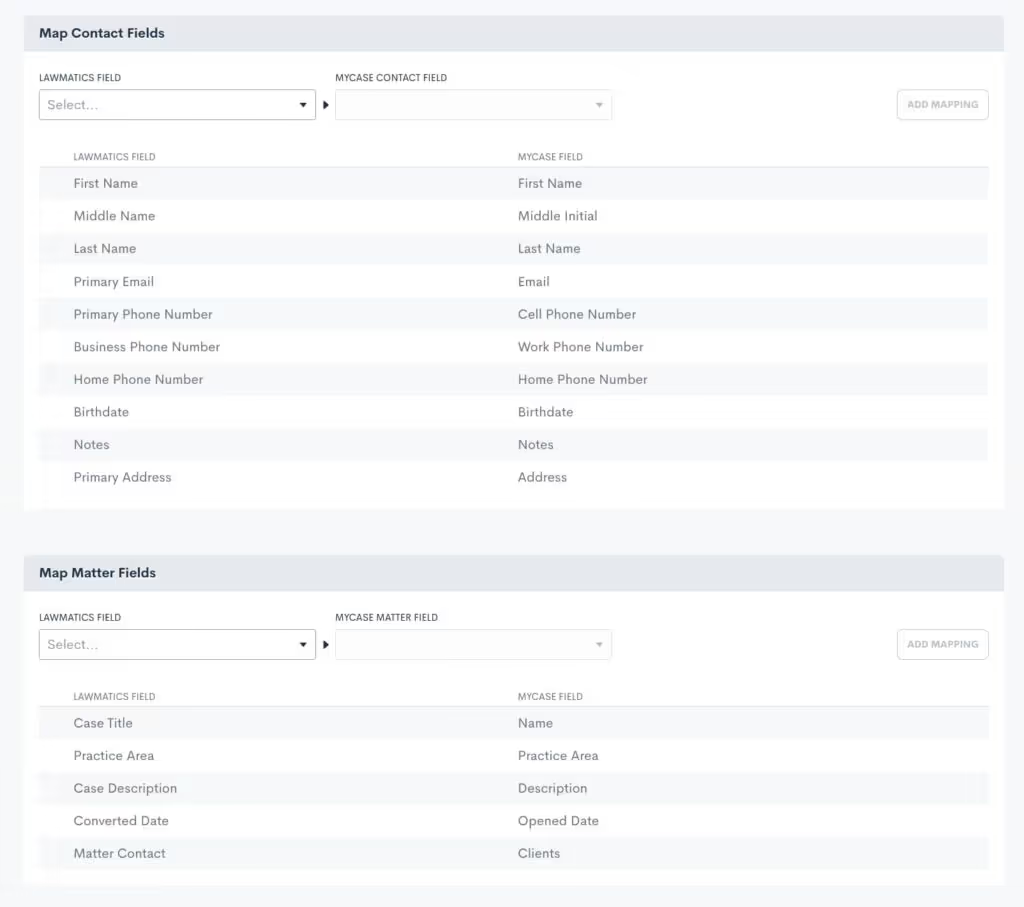
All of the manual work of making sure all details and relevant files get moved over to MyCase will be taken care of on the Lawmatics integration page.
How to integrate Lawmatics and MyCase
Already using both platforms? Setting up the integration is quick and easy. Just head to the integration settings page in Lawmatics, click the MyCase icon, and follow the simple connection steps. You’ll need your MyCase login credentials, so have those handy. For more information, please visit our Help Center.

Get started with Lawmatics + MyCase
If you’re a MyCase user looking for a better way to manage client intake, schedule a demo with Lawmatics today and see how our growth platform can take your firm to the next level.For more details on this and other Lawmatics integrations, check out our dedicated integrations page.
Running a law firm means juggling a lot of moving pieces — client communications, case details, marketing efforts, and scheduling, just to name a few. Without the right tools working together, things can get messy fast. That’s where Lawmatics integrations come in. Instead of wasting time on duplicate data entry or switching between disconnected platforms, you can automate key processes and keep everything in sync.In our latest Deep Dive Webinar, Lawmaticians Devon and Clare walked through how these integrations make day-to-day operations smoother, from keeping calendars updated to tracking marketing performance. Let’s break it down.
Time Stamps of Key Takeaways
0:00 — Why integrate?
Devon and Clare kick things off with an overview of how integrations generally work, and a glimpse at the full library of native Lawmatics integrations. They outline how integrations can really take the busywork out of your day to day, keeping everything in sync, from case management and marketing to client communication.
9:39 — User integrations
Devon and Clare dive into user integrations, which sync applications with Lawmatics for individual users within your firm. Email sync automatically logs client messages and attachments in Lawmatics, reducing inbox clutter and keeping communications organized. Calendar sync prevents scheduling conflicts by updating availability in real time. The Zoom integration ensures virtual meetings are seamless by generating and embedding links directly into invites. Since these are user-specific, each person needs to enable them individually, but once set up, they make day-to-day tasks far more efficient.
20:44 — Call integrations
Law firms handling high call volumes can track and manage inbound and outbound calls directly within Lawmatics. The RingCentral integration enables outbound calls directly from a matter, while also logging inbound calls for easy reference. CallRail takes tracking a step further by offering recorded call playback and marketing insights, allowing firms to analyze call performance.
28:23 — Case management integrations
Lawmatics integrates with leading case management platforms to ensure a smooth transition from intake to ongoing case work. Our hosts took a closer look at how Lawmatics syncs with Clio Manage, automatically transferring client and matter details, documents, and notes at the point of conversion. They also discuss some of the differences between our integrations with some of the other popular case management systems.
37:42 — Marketing integrations
Law firms need clear insights into where their best leads are coming from, and Lawmatics integrations make that easy. The Google Ads integration pulls campaign data and ad spend directly into Lawmatics, helping firms measure return on investment without jumping between platforms. (Devon also teased upcoming improvements to this integration!) CallRail plays a role here, too, by tracking call sources so firms know exactly which campaigns are driving inquiries.
41:00 — For everything else, there’s Zapier
When a direct integration isn’t available, Zapier fills the gap by connecting Lawmatics to thousands of additional applications. Whether linking with Calendly for scheduling, Google Sheets for tracking, or various case management and payment platforms, Zapier automations work like Lawmatics workflows — triggering actions to keep data in sync.Check out our entire catalogue of integrations at lawmatics.com/integrations.
Webinar slide deck
Big changes are here, and we couldn’t be more excited to share them with you! We decided there was no better way to start the year than by giving Lawmatics a refresh — one designed to make your experience smoother and more straightforward.This isn’t just a facelift; we made these updates based on extensive research into how our users access different features throughout their day. A new layout, smarter organization, and refined workflows mean you’ll spend less time clicking through menus and more time on revenue-generating tasks.
Welcome to the new navigation panel

The first thing you’ll notice is that the navigation bar has moved — from the top of the screen to a sleek sidebar on the left. Here’s what’s new:
- Simplified menu structure. We’ve grouped related tools and tabs to better reflect your workflow. Some of our previous groups were a bit broad, so we created labels that are more intuitive.
- Persistent access. Now, when you open a tab, it stays open, making it easier to navigate without losing your place. This update builds on the previous design by keeping key menus readily accessible as you work.
- Collapsible design. Prefer more screen space? Collapse the sidebar for a cleaner, distraction-free view — perfect for reviewing matters or data.
- One-click buttons. New navigation buttons now take you straight to frequently used pages in the app, like the Calendar and Dashboard, making it even easier to get where you need to go.
Automations and reminders
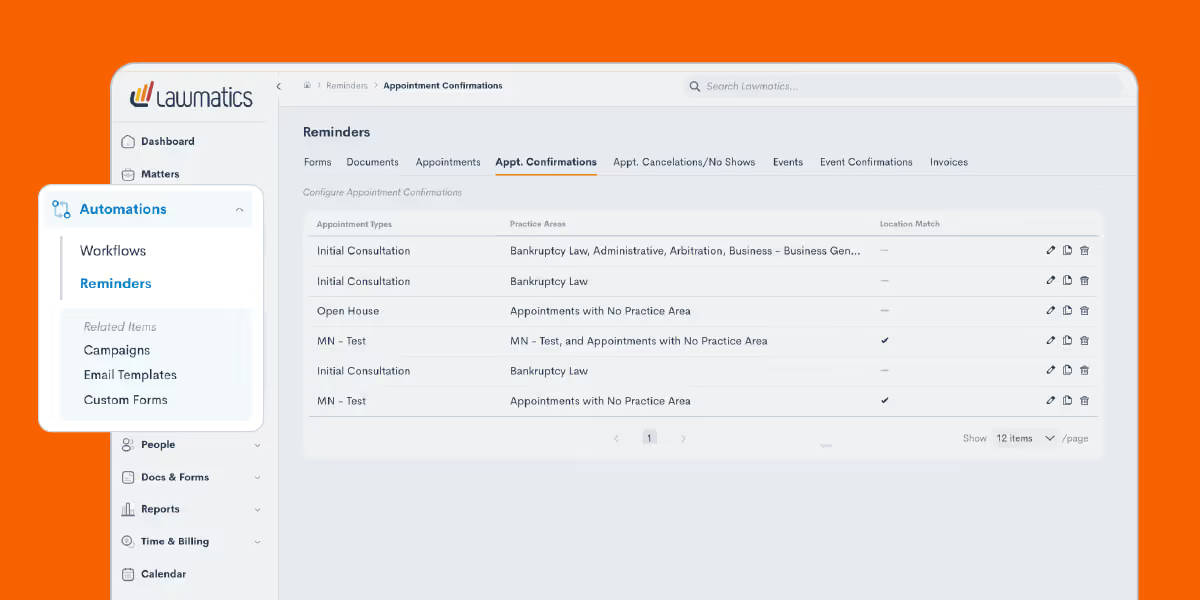
To make automation management and reminders more accessible, we’ve reorganized these tools into a centralized location. Your automation builds are now called Workflows, a name that better represents their function and simplifies navigation. This group now also consolidates all of your reminders, from forms to invoices, into one place. Now, instead of being spread across different features, reminders are all housed in a single hub, making them easier to track and manage than ever.
One marketing hub for client engagement
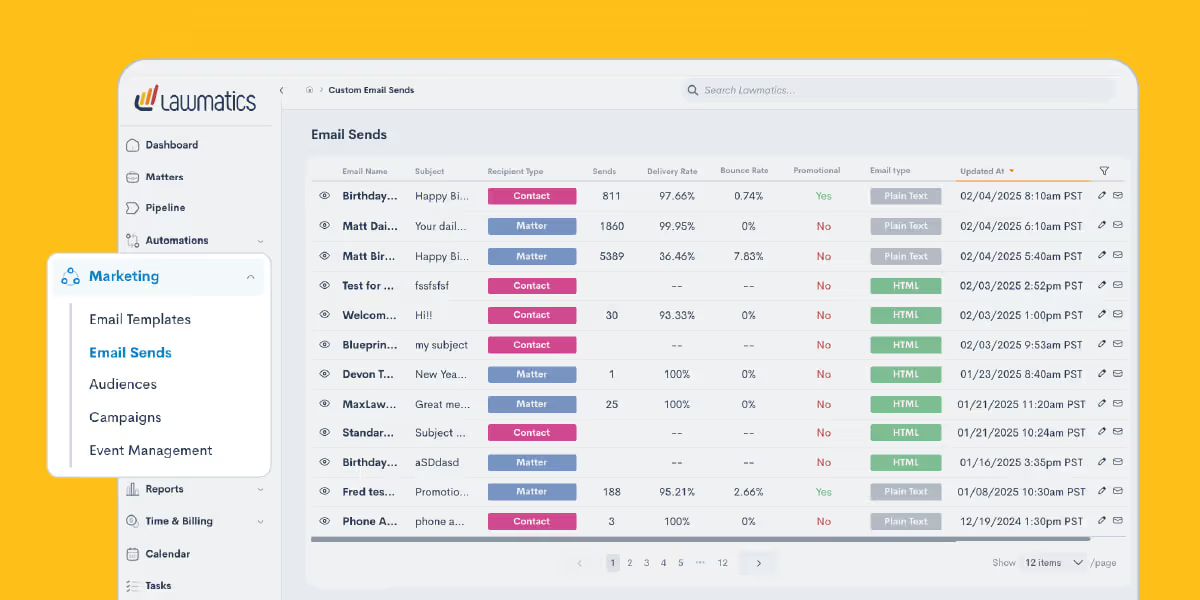
Your Marketing tab has been reimagined to create a seamless journey from initial contact to lasting engagement. Now, everything is structured to help you connect with potential clients, nurture relationships, and drive conversions in a way that feels natural and intuitive.
Emails
Start with Email Templates, where you can craft messages that resonate every time. Save your best-performing content and repurpose it effortlessly, ensuring consistency in your outreach. When it’s time to send, head to Email Sends, your go-to for delivering targeted messages to leads and existing clients with just a few clicks.
Audiences
To ensure your emails land with the right audience, the Audiences tab allows you to organize contacts into meaningful groups. A personal injury firm, for instance, might segment contacts by case type — auto accidents, slip-and-fall claims, or workplace injuries — so each message is hyper-relevant. This way, every email is not just sent but resonates with recipients, guiding them toward the next step in their legal journey.
Campaigns & event management
With your emails in motion, the Campaigns tab becomes your control center. Here, you can track performance, tweak messaging based on real-time insights, and optimize engagement. But what happens when an email sparks interest, and a lead wants to learn more? That’s where Event Management comes in. Whether it’s a live webinar, an educational lunch-and-learn, or an in-person networking event, you can manage registrations, track attendees, and follow up afterward. This keeps potential clients engaged and strengthens your connection with them before they even step into your office.By organizing the Marketing tab around the natural flow of client engagement, Lawmatics turns your outreach efforts into a well-oiled machine — attracting, nurturing, and converting leads with ease.
Contacts and matters
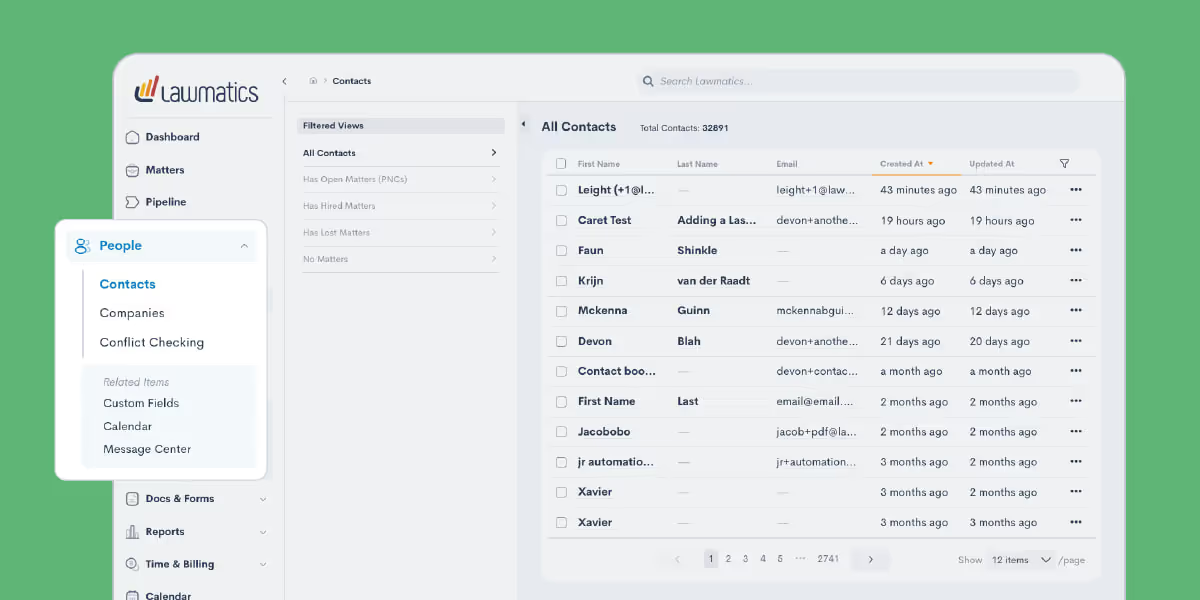
Most of the features previously found under the CRM group are now housed in the new People tab, the central hub for everything related to your clients. Here, you’ll find key details like contact information, company associations, and conflict checking.But managing client relationships isn’t just about storing information; it’s about meaningful engagement. That’s why we’ve also included tools that help you take action. For instance, after reviewing a client’s personal details, you may want to follow up with them directly. To make that next step as simple as possible, we’ve added a direct link to the Message Center under the People tab, allowing you to send an email without disrupting your workflow.
Documents and forms

The first change here is that we relabeled this group from Assets to Docs & Forms, your one-stop shop for information sharing. Emails have moved to the Marketing tab, while most other features remain in this section for easy access.To streamline navigation, we’ve separated some existing functions. Document Templates, for example, have their own page, and we’ve added a new E-Signatures section for you to monitor your document signing requests. While new e-signature documents can’t be created from this page, you can monitor when requests were sent and whether they’ve been completed.We applied this same approach further down in this section — File Request Templates and File Requests are now distinct, making it easier to manage each separately. You’ll also find Firm Files here, a central space for storing welcome packets, images, and other attachments you regularly use with clients.
Recap
The brand-new Lawmatics interface is about giving you a platform that works the way you do. Every one of these changes is based on user feedback and real-world usage patterns. We are pumped for how these upgrades will make your daily workflow even smoother and more efficient. And we’ve got even more updates planned — so stay tuned throughout the year!If you haven’t used Lawmatics yet and want a firsthand look at the platform, now is the perfect time to check it out. Get a fully personalized demo and see for yourself how we’ve built our platform with legal professionals like you in mind.
Kicking off the year with a bang, we’ve introduced a fresh, intuitive user interface built for you! From reorganizing your favorite tools to creating a more intuitive workflow, this redesign is designed to save you time and simplify your day-to-day. We know change can be exciting — and maybe a little daunting — which is why we couldn’t wait to walk you through the new Lawmatics interface. Let’s get straight into it.
Time Stamps of Key Takeaways
0:00 — Why the new look?
Your host, Lawmatics Product Manager Devon Roth, kicked things off with a walkthrough of why we’ve revamped the UI. This redesign is all about making things easier for you. We’ve streamlined the layout, made the interface more intuitive, and focused on functionality — so you can spend less time clicking and more time doing.
9:39 — New tabs on the side navigation
Dashboards, Matters, and Pipelines are now just a click away with new tabs on the side navigation — no more digging through menus! We also gave Dashboards its own special tab outside of the Lawmatics logo, so it’s quicker than ever to check in on your numbers.
12:58 — Automations and reminders reorganized
Our previous interface sometimes required users to hunt through different locations in the app to set reminders for specific moments in the client journey. But good news: You can now manage all your reminders in one place under the new Reminders tab. You'll also notice that all of your automations can now be found under the new Workflows subtab.
16:22 — Marketing made more intuitive
The new Marketing tab is organized to follow the flow of your campaigns, from building email templates to selecting audiences and launching your outreach. We also regrouped event management tools here since seminars and webinars are often key to attracting new clients. Previously, these tools were part of the CRM tab, but this update brings together all marketing-related features into one place.
27:43 — People at the center
Just like Marketing, the People tab includes features that were previously grouped under the old CRM heading. We’ve restructured and decluttered this section, making it easier to navigate. Whether you’re adding new contacts or updating existing ones, the streamlined layout helps you quickly find what you need.
29:09 — Docs & Forms
This tab is your one-stop shop for receiving and sharing information with your clients, whether it’s intake forms, e-signatures, or file requests. It’s also the home of other firm files that were previously grouped under the old Assets tab, like premade welcome packets for new clients.
32:13 — Q&A and recap
We left plenty of time to talk through questions about all the changes in the new interface. Devon touched on the Reports and Time & Billing tabs, which remain largely unchanged, and clarified where to find tools that might have moved. It’s a great segment to watch if you’re wondering, “Wait, where did that feature go?” We also shared tips to help you make the most of the updates and collected feedback for future improvements.
Webinar slide deck
For law firms, managing client data across multiple platforms has always been a headache. Entering details into multiple systems, making new typos at every turn, wasting precious time that could be better spent helping clients — juggling data like this is frustrating, inefficient, and frankly, risky.The good news? We’re continuing to build solutions to meet legal professionals where they are.Our recently announced integration with CARET Legal is designed to eliminate hassle, minimize risk, and save administrative hours that tend to add up.Watch the webinar below to see the integration in action, or keep reading for a full breakdown of how it works and what it means for your firm.
Why integrate with CARET Legal?
Transferring data from intake to case management systems is a time-sucking ordeal for most firms. This process pulls focus away from serving clients and generating revenue. In many law firms, this kind of data work is how nearly half of a lawyer’s non-billable time gets spent on administrative tasks.Every manual keystroke introduces a new chance for entry errors, omissions, and other costly mistakes. Data mishaps can have serious repercussions like miscommunication, erroneous invoices, and shaken client trust.By connecting our CRM to CARET Legal, we’re lifting this burden off law firms, while providing complete control over data management. With this integration, you’re not just streamlining your processes — you’re gaining peace of mind.
Seamless data transfer between systems
Forget fumbling between platforms and re-entering the same matter details over and over again. Our integration takes care of that for you. With just a few clicks — or a pre-set automation — your client data hops seamlessly from Lawmatics to CARET Legal. This instant sync keeps your information flowing from intake to case management, making those cumbersome transfer processes a relic of the past.
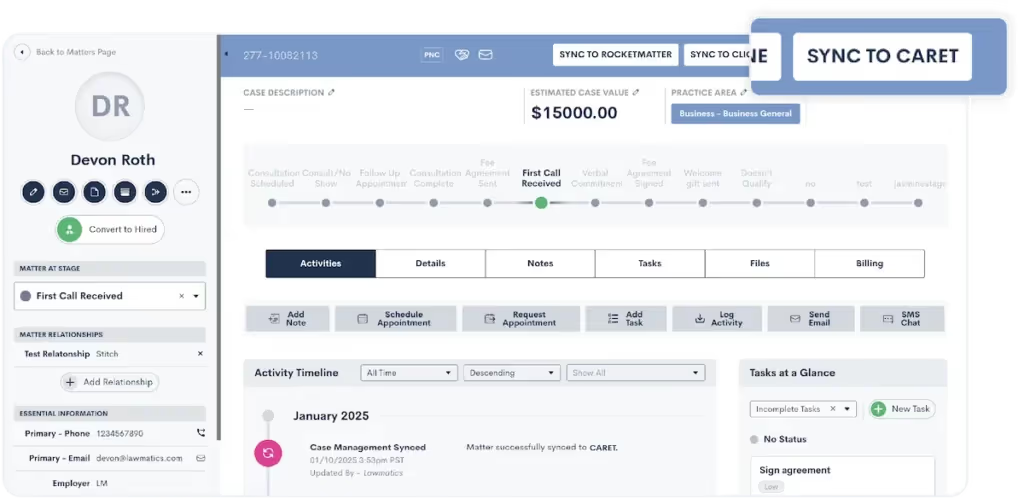
Here are your options for how to sync matters:
- Sync manually: When a matter is ready to sync to CARET Legal, just click on the “Sync to CARET” button on the top right of your screen and confirm your choice.
- Sync automatically: Set up an automation that triggers the matter to sync to CARET Legal upon the matter converting to a Hired status.
Maintain data integrity with confidence
The phrase “garbage in, garbage out” haunts every intake manager. And inconsistent data can spell trouble faster than you can remember how to spell “certiorari.” In fact, an ABA study found that administrative errors, like clerical errors and lost files, accounted for 23% of all malpractice claims a few years ago.But now, with this integration, you can rest easy knowing that data integrity is maintained at every step. With a simple transition from one stage to the next, you can be confident that your data is always clean, consistent, and accurate. Say goodbye to typos and discrepancies.
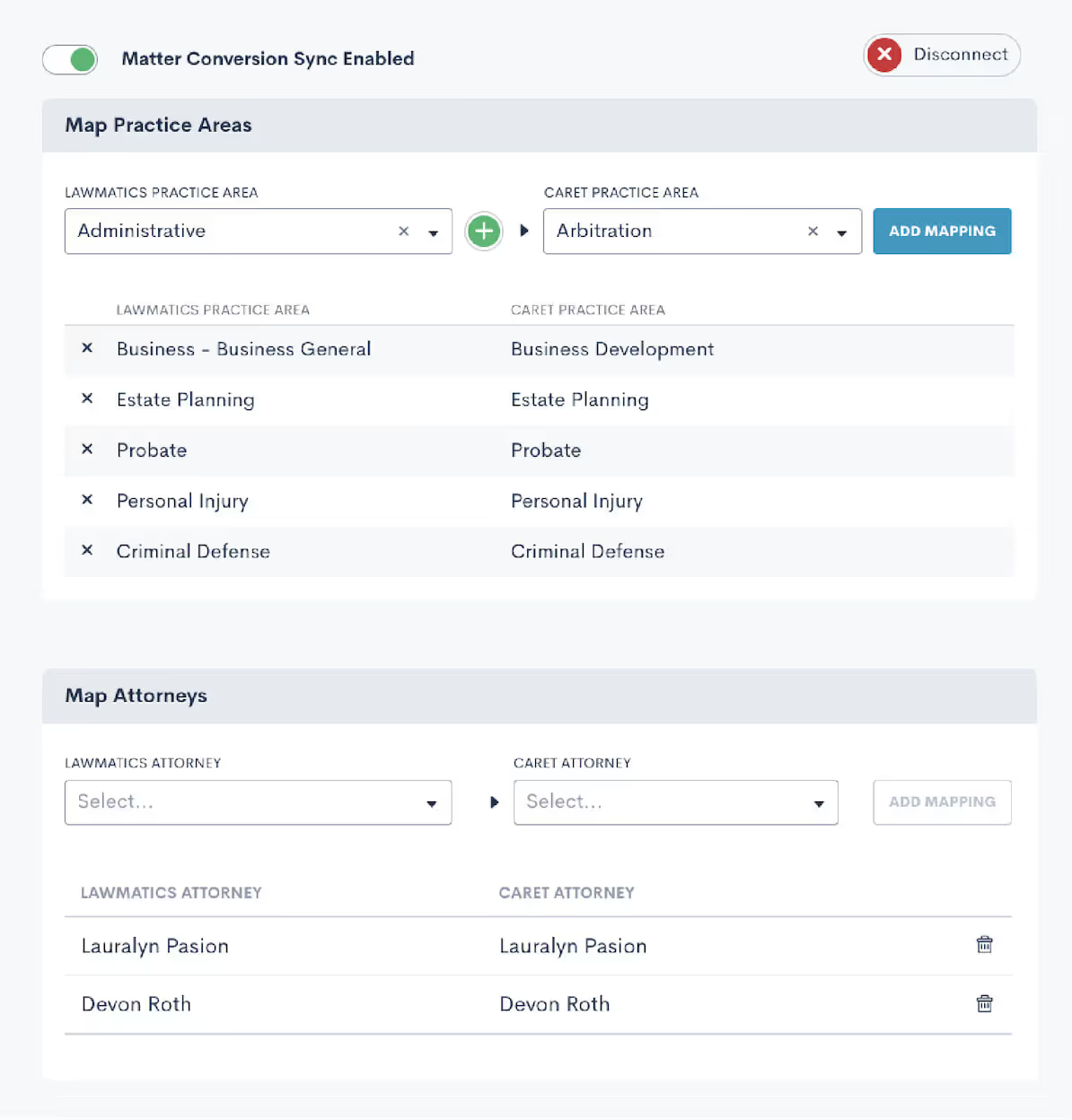
Save time on administrative hassle
Time is your most valuable resource, and every minute wasted on repetitive tasks is a minute you can’t dedicate to clients. The Lawmatics + CARET Legal integration takes tedious tasks off your plate, creating more time for clients and building your business. In a nutshell: more productivity, less busywork. Refocus those energies into client service or tasks that actually generate revenue.

Get started with Lawmatics + CARET Legal
It’s time to reclaim your day from the clutches of inefficient processes and redundant data entry. The Lawmatics + CARET Legal integration is here to make your workflows smoother, your data more reliable, and your practice more efficient. Current Lawmatics users can log in to set up your integration today.If you’re a CARET Legal user looking to revolutionize intake for your firm, book a Lawmatics demo to check out our CRM for yourself.If you’re interested in learning more about CARET Legal, visit our dedicated integration page.
Subscribe to get our best content in your inbox
Ready to grow your law firm with Lawmatics?
Schedule a demo of legal’s most trusted growth platform.
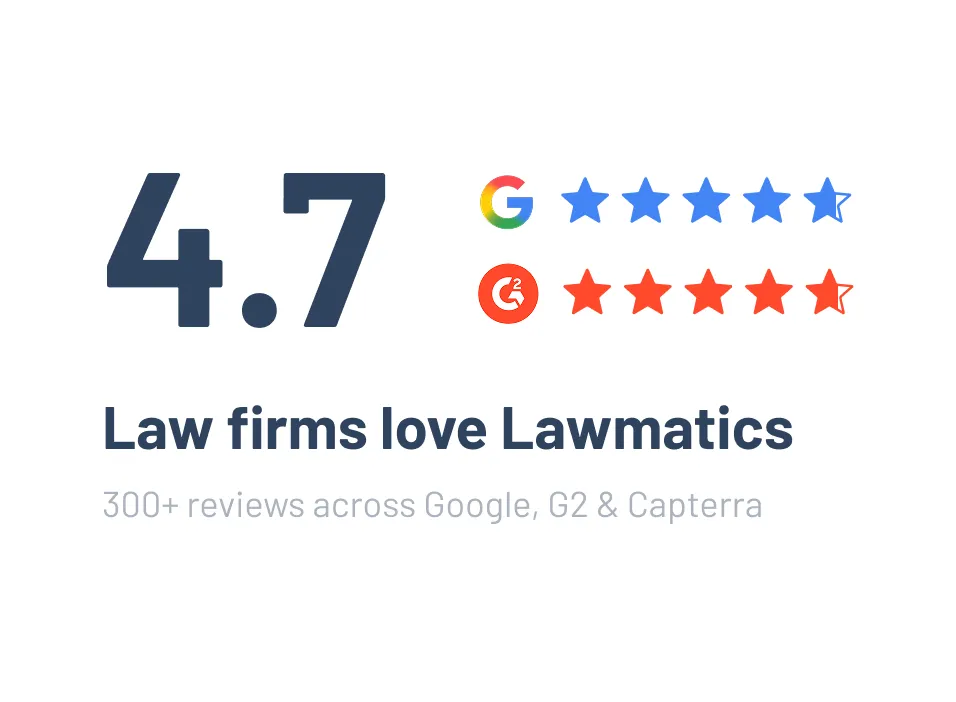




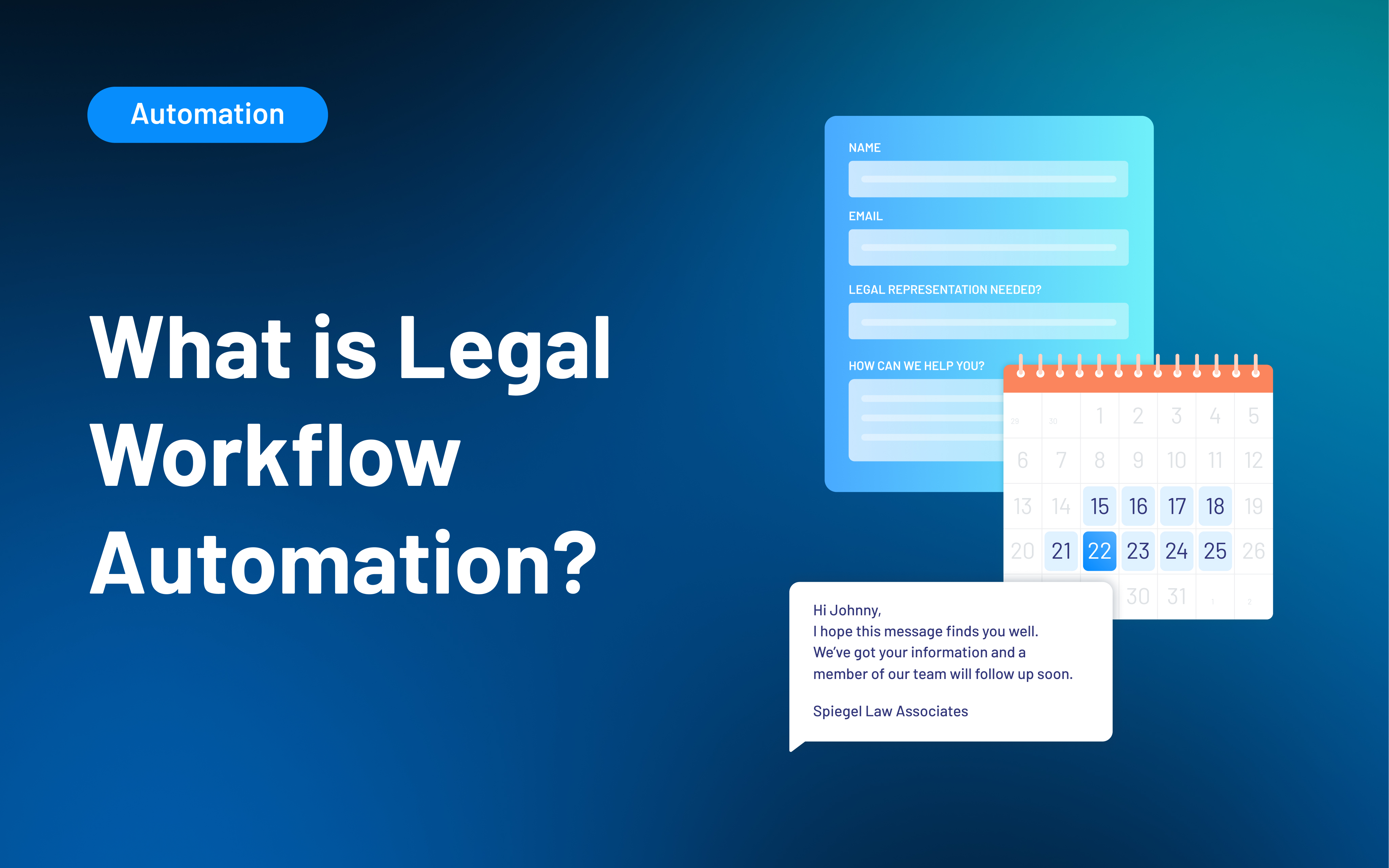



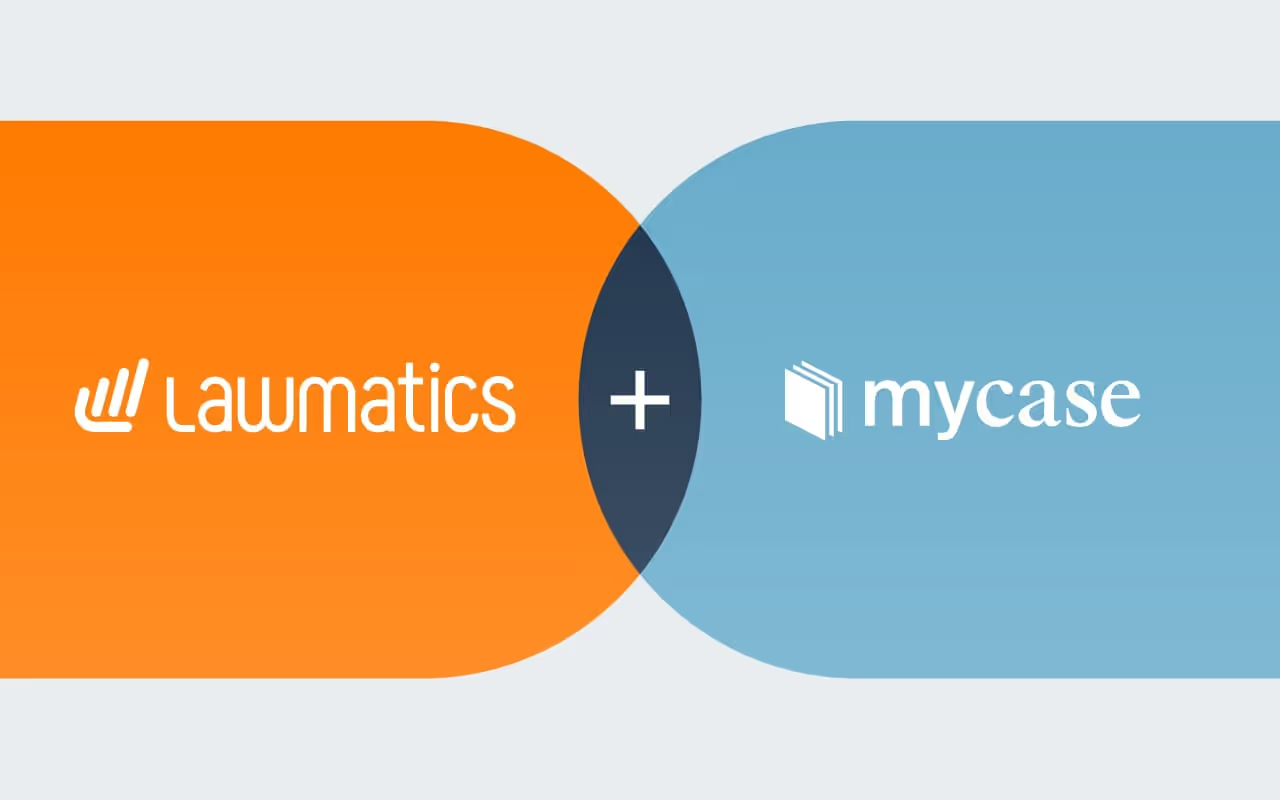


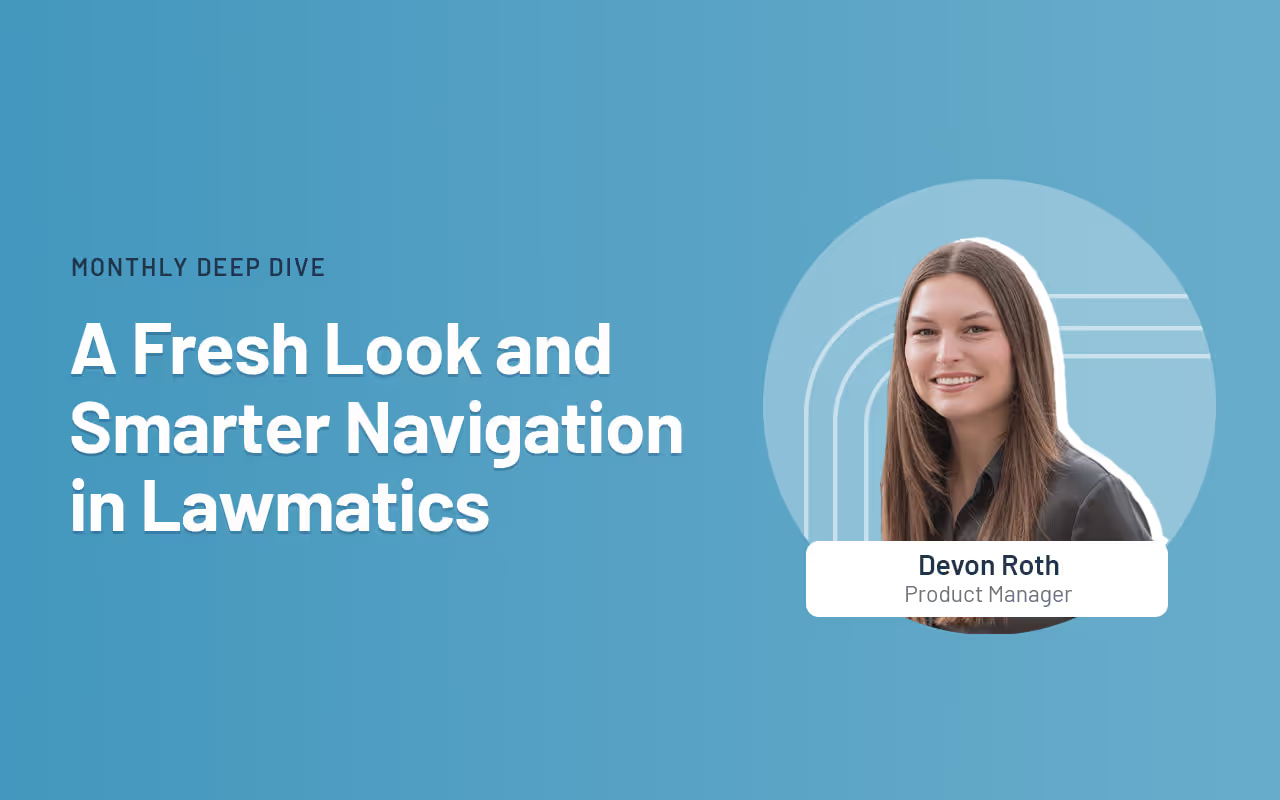
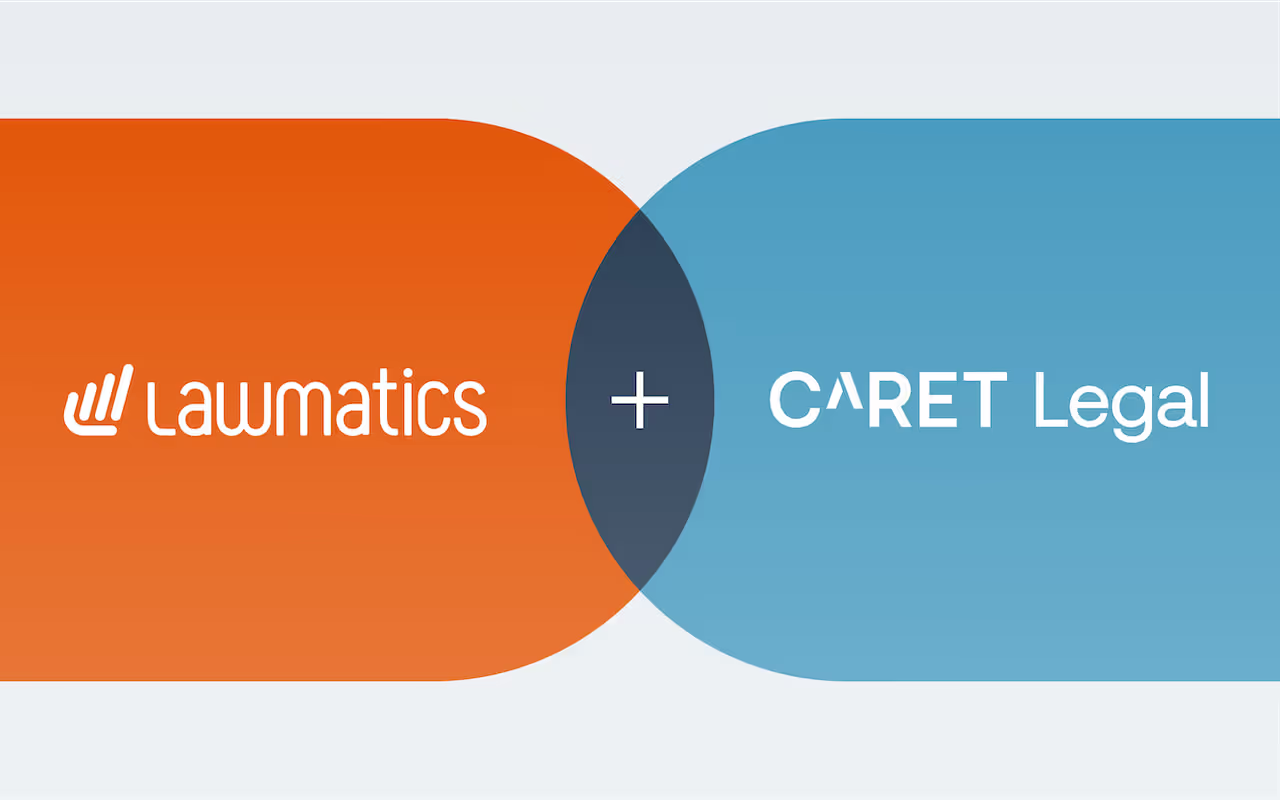
.avif)
.avif)

.avif)
